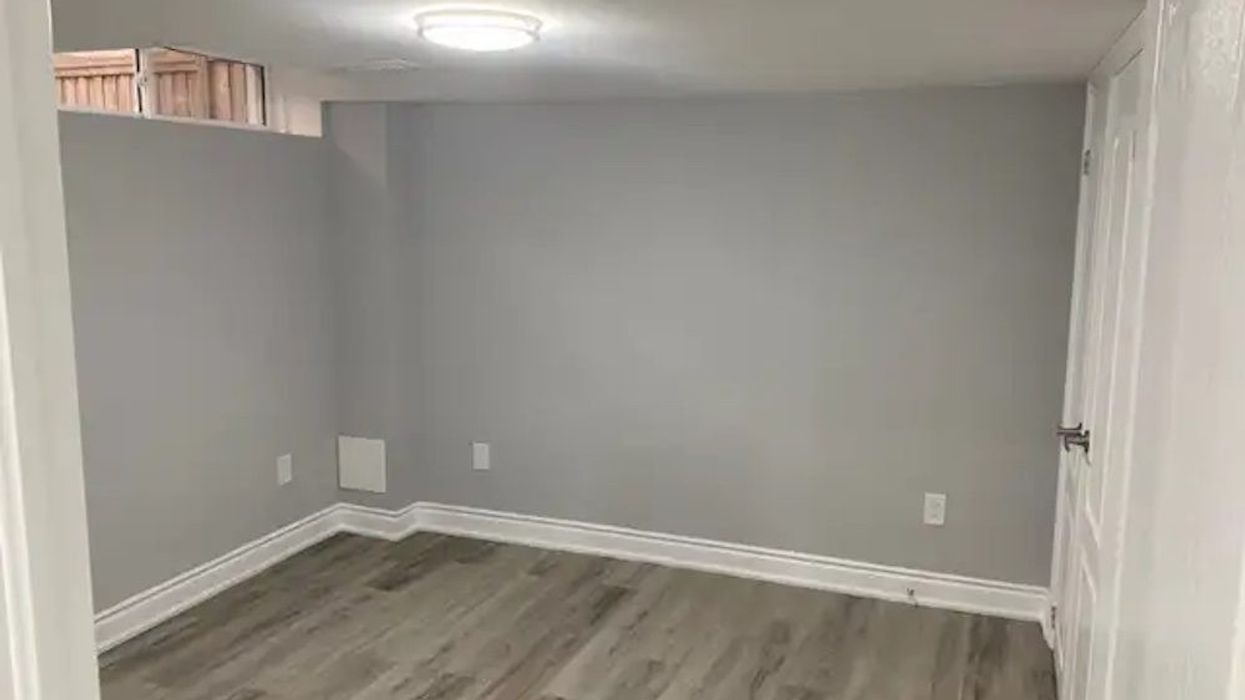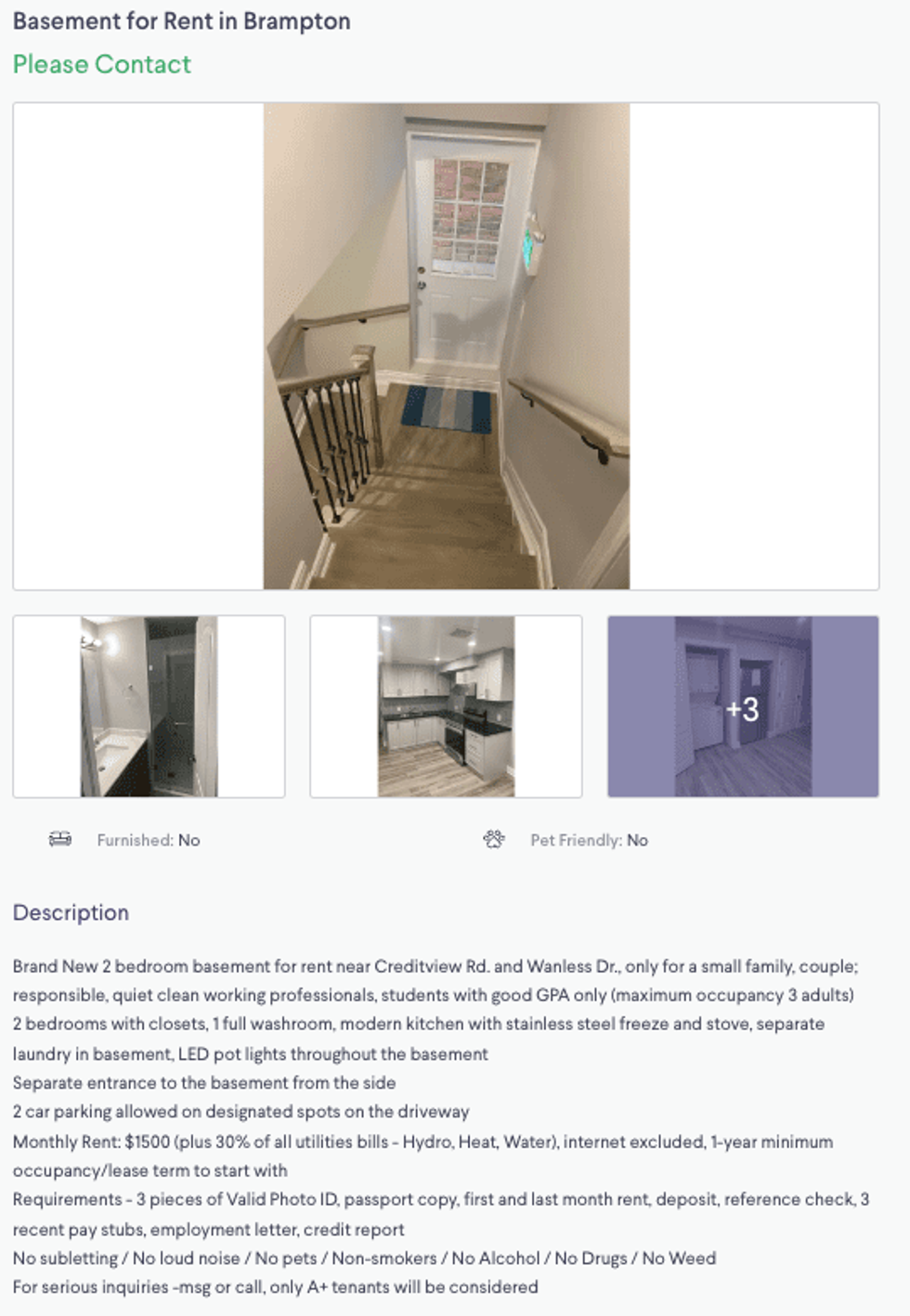With rental demand surging all across the GTA, finding an apartment is hard enough as it is. But for renters looking to snag a two-bedroom basement apartment recently listed in Brampton, many would have been immediately disqualified based on some rather questionable criteria included in the listing.
The rental, located near Creditview Road and Wanless Drive on the west side of Brampton, was listed on Kijiji as being available "for a small family, couple, responsible, quiet clean working professionals," or "students with good GPA only."
The listing then goes on to say that the renter is not allowed to sublet, create loud noise, have pets, smoke, or have alcohol or drugs, including weed. The landlord also required three pieces of valid photo ID, a copy of the applicant's passport, first and last month's rent, a deposit, a reference check, three recent paystubs, an employment letter, and a credit report.
"Only A+ tenants will be considered," the listing reads.
The landlord did not respond to requests for comment, but soon after being contacted by STOREYS changed the wording of the Kijiji ad to remove the eye-brow raising qualifiers. The listing no longer specifies what types of people are allowed to apply, and makes no mention of alcohol, drugs, pets, sublets, or loud noises. The photo ID and recent paystub asks were dropped from three to two, and needing to provide a copy of a passport is no longer listed. The first and last month's rent are now listed as being the deposit, rather than the deposit being listed as a separate item.
Douglas Kwan, director of advocacy and legal services for Advocacy Centre for Tenants Ontario, said that although some of the landlord's initial asks go against the Residential Tenancies Act, they're not unique.
"This happens quite often and we're seeing more of this every year leading up to the affordable housing crisis that we're currently in," Kwan said. "The fact of the matter is with low vacancy rates, with rentals increasing at a rate above the rate of inflation, tenants are left with very little choice, really, and then some landlords feel emboldened to ask for things that are in breach of the legislation."
READ: National Average Rents Rose Nearly 10% in June: Report
In Ontario, “no pets” clauses in rental agreements are not valid, with exceptions for rentals inside a condo building that has building-wide pet rules or for rentals where either the owner or another resident in the same accommodation has an allergy. In terms of required payments, Ontario allows landlords to ask for first and last month's rent, but they cannot ask for any additional deposits.
Although issues like requiring a good GPA to qualify for a rental aren't specifically addressed in Ontario legislation, Kwan says that it has the potential to be seen as discriminatory.
"It's not specifically allowed," Kwan said. "One could look at it and infer that... they're not willing to rent to people who don't have a high education, or rent to people on social assistance potentially."
The rental's bans against alcohol, smoking, and weed are similarly susceptible to claims of discrimination.
"I think we've matured as a society to understand that addiction is a health problem," Kwan said. "And those who have addictions are often considered people with a disability. So in line with the Ontario Human Rights Code, people cannot be discriminated against based on disability."
The issue, however, often becomes that discrimination in these instances is difficult to prove as it's typically implied and not directly expressed. This, compounded with the fact that tenants often don't want to pursue a case with the Landlord and Tenant Board or the Ontario Human Rights Tribunal, both of which have lengthy backlogs, means that these landlords often get away with imposing illegal requirements.
"We hear these cases almost on a daily basis through our Attempt to Counsel program," Kwan said, "Given the state of our tribunals in Ontario, where people are waiting many months and sometimes over a year to have their matter heard... people really are more focused on their everyday. How are they going to put food on the table? How are they going to find a roof over their heads rather than face the long delays associated with litigating this matter and ensuring that landlords don't discriminate against others?"
Kwan notes, however, that the Ministry of Municipal Affairs and Housing has the ability to investigate these issues without a complainant having to make a case themselves. And if a landlord is found to be in violation of the Residential Tenancies Act, they can be slapped with hefty fines.
"They could contact the landlord and explain what their responsibilities are and give them the option of removing the ad or changing the language," Kwan said. "If they refused to do so, they could move forward with civil proceedings against them."






















